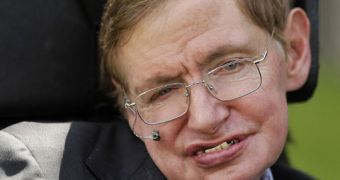Worldwide-famed astrophysicist Stephen Hawking, aged 66, one of the most brilliant contemporary minds, will retire from his prominent position of Lucasian Professor of Mathematics at Cambridge University next year. The policy of the institution requires that its members step down the academic year they turn 67, which in Hawking's case is on January 8th, which means that next September will see him retiring. Still, he intends to continue his work, which helps with discovering and understanding the universe from his honorific position of Emeritus Lucasian Professor of Mathematics.
The Lucasian post was founded by Reverend and Parliament Member Henry Lucas in 1663, who donated his collection of 4,000 books (which included Galileo Galilei's “Dialogo” written in 1632) and some of his estate to the university. The land would yield a £100 each year, enough for the university to fund a the “mathematick” position now known as the Lucasian Professor of Mathematics, which was made official one year later by King Charles II. Among the occupants of the position was also Sir Isaac Newton, while Hawking was appointed in 1979.
Hawking is a constant presence in the research related to the universe, through his theories, books or opinions on new research. His demonstrations on black holes, for example, changed the opinion according to which nothing could escape them, proving that they did, in fact, emit a faint thermal energy and a small amount of light (the Hawking radiation), and also that their life was not infinite. “A Brief History of Time,” followed by a more comprehensible “The Universe In A Nutshell” were his two international bestsellers, but he wrote about a couple of hundred publications. There is a bronze statue that represents him and a museum that bears his name.
He was distinguished with an impressive number of honors and awards, and his witty humor is always appreciated in conferences and talk shows. His Lou Gehrig disease and his speaking ability impairment prevented him from leading a more active social life, but helped him focus more intensively on his research. In the past, he lost a bet related to the information that crossed the event horizon of a black hole (which also caused him to change his former opinion), but that didn't stop him from recently betting another $100 on the fact that the LHC would not manage to find the Higgs boson.
“The LHC will increase the energy at which we can study particle interactions by a factor of four. According to present thinking, this should be enough to discover the Higgs particle. I think it will be much more exciting if we don't find the Higgs. That will show something is wrong, and we need to think again. I have a bet of $100 that we won't find the Higgs,” stated the astrophysicist in an interview for BBC.

 14 DAY TRIAL //
14 DAY TRIAL //